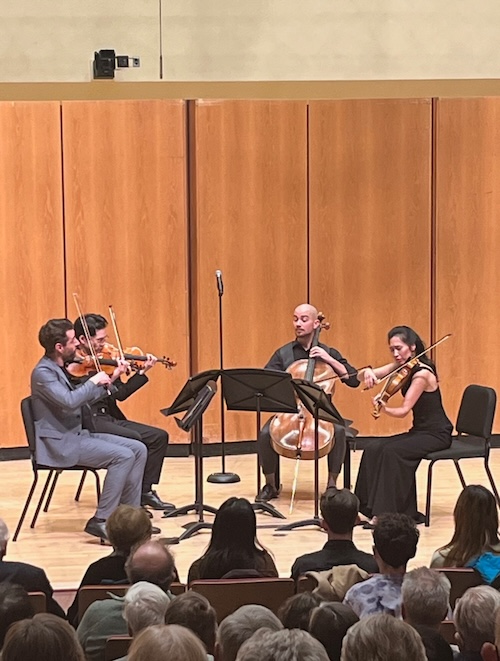With a new violist, the Dover Quartet delivers remarkable playing at Winter Chamber Music Festival

There have been occasions when the Winter Chamber Music Festival has really lived up to its name.
In the festival’s early days, during a Brahms piano quartet performance by Daniel Barenboim and CSO members Chicago was hit with a massive blizzard, leaving the audience to depart, musically warmed but with an hours-long drive home.
Friday’s ominous, click-bait weather reports suggested a similar fate for the evening’s festival concert by the Dover Quartet. As it turned out, the day’s early snow and rain cleared up by concert time allowing a near-capacity audience to make its mucky way to Pick-Staiger Concert Hall in Evanston.
That was fortunate for the Dover Quartet delivered a remarkable performance, one of the finest chamber events heard in recent years.
That their concert proved so rewarding was even more impressive considering the group’s personnel upheaval of the past two years. Violist Milena Pajaro-van de Stadt departed in 2022 and Hezekiah Leung temporarily filled the position last season.
Friday’s event marked the first local appearance of the Dover Quartet with Julianne Lee as its new and permanent violist. A member of the Boston Symphony Orchestra for 18 years, the versatile Lee is currently the BSO’s assistant principal second violinist.
Based on Friday’s concert, Lee seems like an ideal choice. She possesses a rich sound and has both the tonal elegance and fearsome technique to match Dover’s founding members (violinists Joel Link and Bryan Lee and cellist Camden Shaw). At times one wanted Dover’s new violist to kick her intensity level up a notch to better match her emotive colleagues. But that’s a minor point on what seems like a smart and discerning appointment.
The evening’s opening work, Florence Price’s String Quartet No 1 in G major, made a worthy calling card for the group in its new configuration. An unfinished work in two movements, the tuneful quartet shows Price’s homespun style at its most ingratiating.
The Dover musician brought complete sympathy to Price’s 1929 quartet, their blend of burnished warmth and acute focus bringing out the relaxed lyricism of the first movement while skirting excess sentiment. The dark, oaky sound of Lee’s viola was a consistent pleasure.
The concluding movement offers one of Price’s’s most endearing melodies. The Dover musicians imbued it with a heart-easing warmth and pointedly contrasted it with the spooky scherzo middle section, deftly smoothing the composer’s abrupt transitions.
Dmitri Shostakovich’s Quartet No. 9 (1964) is a more equivocal and less frequently heard work than its immediate predecessor, the composer’s most performed of his 15 works in the genre. While not on the masterpiece level of the Eighth Quartet, the Dovers made a strong and effective case for this austere, unsettled work with masterful pacing of its alternating fast and slow movements (played attaca).
The uneasy cantering of the Moderato opening movement is wholly characteristic, and the ensemble brought live-wire intensity and searching expression to the ensuing sections. The fast section of the sardonic central Allegretto went with relentless drive, and Bryan Lee’s hard pizzicatos in the ensuing Adagio were like ricocheting bullets. First violinist Link’s plaintive solo over a drone accompaniment made expressive impact, one of Shostakovich’s voice-in-the-wilderness moments.
The finale was off to the races with the rhythmic main theme taken at a lightning tempo. The various episodes were forcefully contrasted—Shaw eloquent in his brief cello solo—en route to a frenetic coda.
The concert concluded with Schubert’s Quartet No. 14 in D minor. Inspired as the first half was, Friday night’s performance of Schubert’s “Death and the Maiden” proved riveting.
All the Dover Quartet’s considerable qualities—faultless intonation and ensemble, consistent control even at top speeds, and a keen blend of tonal warmth and incisiveness—were manifest from the first notes in a deep and notably fresh performance of this much-played work.
The players brought emphatic attack to the brusque opening theme; yet they always remained in period with a 19th-century sensibility, as with the lilting elegance of the piquant second subject. In the driving development section one was struck by the polish and finesse of the playing even in the most hard-charging pages.
In the Andante, which draws its dirge-like theme from the title Schubert song, the players were at their finest with Link’s gentle, sweet-toned violin and Shaw’s eloquent cello highlighting the first two variations, The galumphing third iteration and the hushed intimacy of the final one were just as well done.
The fleet-footed Scherzo brought listeners back down to earth and the Dover members brought an engaging Biedermeier warmth to the uber-Schubertian trio.
The tarantella-like finale was taken at a crackling pace, putting across the jumpy urgency of the music. It was hard not to be floored by the power and virtuosity of the playing, with dazzling articulation by violinists Link and Lee. The mercurial shifts in tempo and material were handled with hair-trigger bravura by all, building cumulatively to an aggressive if hardly affirmative D-minor coda.
If there is a better chamber group than the Dover Quartet playing right now, I have yet to hear them. Northwestern’s Bienen School of Music (and the Curtis Institute) are most fortunate to have this stellar quartet as ensemble in residence.
The Winter Chamber Music Festival continues 3 p.m. Sunday with the Calder Quartet. The program includes Beethoven’s Quartet No. 3 in D major, Op. 18, no. 3, Thomas Adès’ The Four Quarters, Caroline Shaw’s Entr’acte and Debussy’s String Quartet. music.northwestern.edu
Posted in Performances

